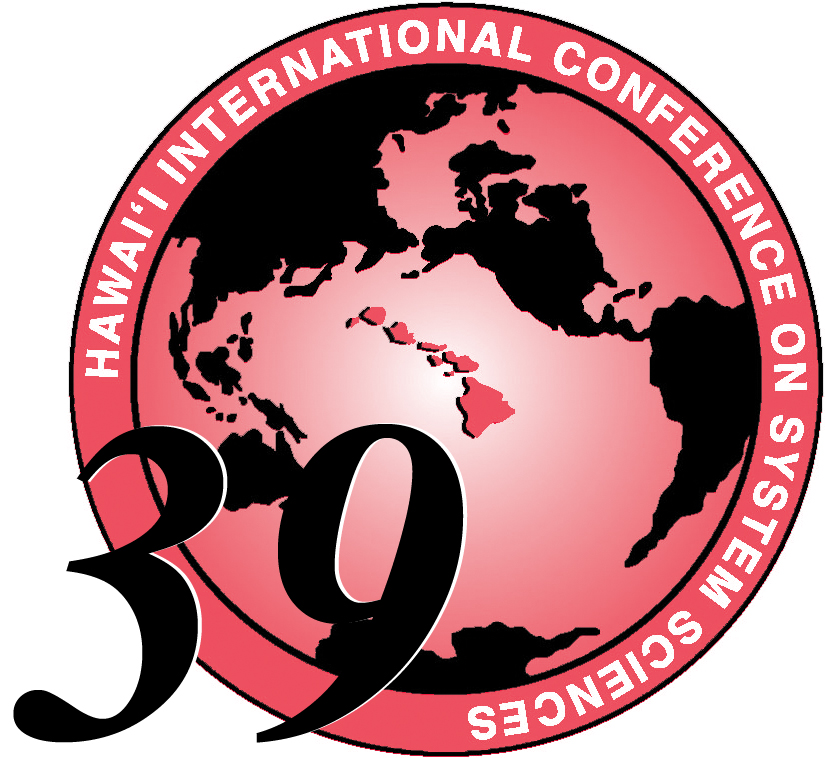
Primary HICSS
Program Components
HICSS-39
January 4-7,
2006
(Wednesday through Saturday)
Hyatt Regency Resort, Kauai

|
Primary HICSS HICSS-39 |
The HICSS series of conferences has become a unique and respected forum in computer and information systems and technology for the exchange of ideas among the researchers and development communities around the world. This reputation derives from the high quality papers and active discussions and interaction which the conference facilitates and promotes. The three program components which specifically contribute to the quality and the interaction are Minitracks, Symposia, Workshops, and Tutorials.
Minitracks
The primary and most formal program component is the minitrack in the regular
conference. The papers are double blind reviewed by at least three reviewers
and published in the Proceedings. The overall acceptance rate is about 50%.
Minitracks for new emerging topics might be somewhat higher, and mature fields
lower. Papers are summarized by the author(s) and discussed in the session.
These discussions frequently result in modifications and improvements to the
papers, so that revised versions of the papers are published in books or
journals. A minitrack may schedule an “open forum” discussion, but no panels
are permitted in paper sessions.
Symposium
A symposium is a full-day of activities focused on a relatively well defined
topic that would be of interest to HICSS attendees. The purpose is to explore,
discuss, document and add to the literature base on that topic where invited
authors present a collection of high-quality academic papers. A symposium is
more flexible than a minitrack and more formal than a workshop. Symposium
leaders may invite papers from specific authors, and may also use more general
calls for submissions. Not all papers presented and discussed at a Symposium
will be published. Those Symposium papers targeted for publication must be
submitted to the peer review system in accordance with the conference schedule,
and reviewed by at least three reviewers in addition to the Symposium leaders.
Papers accepted by this process will be included in the symposium section of the
HICSS proceedings. Symposium leaders will submit a progress report by June 1
showing the status of the planning for the Symposium.
Tutorials
A tutorial is a half-day or a full-day gathering which is cross-disciplinary in
nature, and aims to give participants a brief overview of the subject matter.
Some tutorials are actually advanced seminars which is an in-depth survey of the
topic for those who already have significant background in the area under
discussion.
Workshops
A workshop is a half-day or a full-day gathering where participants discuss
position papers on a particular topic with the goal of advancing thinking and
discovering new insights on that topic during the workshop. Workshop leaders
may invite specific contributors, and may also use a more general call for
contributions. Position papers will not be reviewed and will not be included in
the formal HICSS proceedings; however, they may be included in a monograph and posted
to the HICSS web
site. Workshop leaders may propose any format that they believe will advance
thinking on the topic -- including but not limited to paper presentations, panel
discussions, technology demonstrations, debates, round tables, and collaborative
authoring sessions. In the months following the conference, Workshop leaders
will edit a paper or monograph that reports the substance and contribution of
the workshop for posting as a monograph or as some other form of
academic publication. A major benefit of a workshop is that it can invite papers
that are not yet ready for formal review, but that are on the cutting edge.
These workshops can actually advance the state of knowledge on a topic by
gathering the leading thinkers to tackle knotty problems. Workshop leaders will
submit a progress report by June 1 showing the status of the planning for the
Workshop.